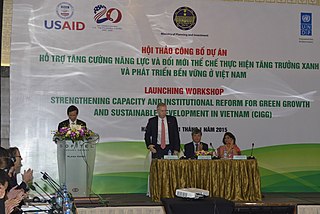
The Findhorn Foundation is a Scottish charitable trust registered in 1972, formed by the spiritual community at the Findhorn Ecovillage, one of the largest intentional communities in Britain. It has been home to thousands of residents from more than 40 countries. The Foundation closed all its educational programmes in September 2023 whereas the Findhorn community eco village at Findhorn houses about 40 community businesses such as the Findhorn Press and an alternative medicine centre.

The United Nations Global Compact is a non-binding United Nations pact to get businesses and firms worldwide to adopt sustainable and socially responsible policies, and to report on their implementation. The UN Global Compact is the world's largest corporate sustainability and corporate social responsibility initiative, with more than 20,000 corporate participants and other stakeholders in over 167 countries. The organization consists of a global agency, and local "networks" or agencies for each participating country. Under the Global Compact, companies are brought together with UN agencies, labour groups and civil society.

The United Nations Institute for Training and Research (UNITAR) is a dedicated training arm of the United Nations system. UNITAR provides training and capacity development activities to assist mainly developing countries with special attention to Least Developed Countries (LDCs), Small Island Developing States (SIDS) and other groups and communities who are most vulnerable, including those in conflict situations.

The Center for International Forestry Research (CIFOR) is a non-profit scientific research organization that conducts research on the use and management of forests with a focus on tropical forests in developing countries. CIFOR, which merged with World Agroforestry on Jan. 1, 2019, is the forestry and agroforestry research center of CGIAR, a network of 15 research centers around the world that focus on agricultural research for sustainable development, working closely with governments and other partners to help develop evidence-based solutions to problems related to sustainable agriculture and natural resource management.
May East is a British/Brazilian urbanist, educator, singer and songwriter. Over the years she has considered herself an artivist.

Bafut is a town located in a modern commune in Cameroon, it is also a traditional fondom. It is located in the Mezam Department, which in turn is located in the Northwest Province.

The United Nations Research Institute for Social Development (UNRISD) is "an autonomous research institute within the United Nations that undertakes multidisciplinary research and policy analysis on the social dimensions of contemporary development issues". UNRISD was established in 1963 with the mandate of conducting policy-relevant research on social development that is pertinent to the work of the United Nations Secretariat, regional commissions and specialized agencies, and national institutions.

Capacity building is the improvement in an individual's or organization's facility "to produce, perform or deploy". The terms capacity building and capacity development have often been used interchangeably, although a publication by OECD-DAC stated in 2006 that capacity development was the preferable term. Since the 1950s, international organizations, governments, non-governmental organizations (NGOs) and communities use the concept of capacity building as part of "social and economic development" in national and subnational plans. The United Nations Development Programme defines itself by "capacity development" in the sense of "'how UNDP works" to fulfill its mission. The UN system applies it in almost every sector, including several of the Sustainable Development Goals to be achieved by 2030. For example, the Sustainable Development Goal 17 advocates for enhanced international support for capacity building in developing countries to support national plans to implement the 2030 Agenda.

The International Day of Forests was established on the 21st day of March, by resolution of the United Nations General Assembly on November 28, 2013. Each year, various events celebrate and raise awareness of the importance of all types of forests, and trees outside forests, for the benefit of current and future generations. Countries are encouraged to undertake efforts to organize local, national, and international activities involving forests and trees, such as tree planting campaigns, on International Day of Forests. The Secretariat of the United Nations Forum on Forests, in collaboration with the Food and Agriculture Organization, facilitates the implementation of such events in collaboration with governments, the Collaborative Partnership on Forests, and international, regional and subregional organizations. International Day of Forests was observed for the first time on March 21, 2013.
Type II partnerships were developed at the Johannesburg World Summit on Sustainable Development in 2002. Arising in opposition to the state-centred eco-governmentality of previous approaches to sustainable development policy, the partnerships facilitate the inclusion of private and civil actors into the management of sustainable development. The partnerships are employed alongside traditional intergovernmental mechanisms in order to effectively implement the United Nations' Agenda 21 and Millennium Development Goals, particularly at sub-national level. Although widely acknowledged as one of the most innovative and effective developments in global environmental governance in recent years, the partnerships have faced criticism due to fears of a lack of accountability, and the risk that they may exacerbate inequalities of power between Northern and Southern states. Despite these reservations, there is a general consensus among state and non-governmental actors that Type II partnerships are a significantly progressive step in global environmental governance in general, and sustainable development discourse in particular.

The International Institute for Sustainable Development (IISD) is an independent think tank founded in 1990 working to shape and inform international policy on sustainable development governance. The institute has three offices in Canada - Winnipeg, Ottawa, and Toronto, and one office in Geneva, Switzerland. It has over 150 staff and associates working in over 30 countries.

The United Nations Office for Disaster Risk Reduction (UNDRR) was created in December 1999 to ensure the implementation of the International Strategy for Disaster Reduction.

In the United Nations, the Post-2015 Development Agenda was a set of talks and discussions that led to the creation of the 2016 Sustainable Development Goals. This replaced the 2015 Millennium Development Goals.
The Global Knowledge Partnership on Migration and Development (KNOMAD) is an initiative of the World Bank that describes itself as "envisaged to be a global hub of knowledge and policy expertise on migration and development issues." The goal is to have it work in close collaboration with the Global Forum on Migration and Development and the Global Migration Group.
The UNESCO-UNEVOC International Centre for Technical and Vocational Education and Training is the International Centre for connecting UNESCO Member States worldwide to develop and strengthen technical and vocational education and training (TVET). The International Centre is located at the United Nations Campus in Bonn, Germany and is financed by both UNESCO and the German government. UNESCO-UNEVOC works in the context of UNESCO’s mandate "to lead and coordinate Education 2030 through guidance and technical support". It undertakes its activities through a global network of TVET institutions comprising departments of ministries, national TVET bodies, Universities, and nationally leading training centers.

Established in 1992, the Major Group for Children and Youth is the United Nations General Assembly mandated, official, formal and self-organised space for children and youth to contribute to and engage in certain intergovernmental and allied policy processes at the United Nations.

Climate change education (CCE) is education that aims to address and develop effective responses to climate change. It helps learners understand the causes and consequences of climate change, prepares them to live with the impacts of climate change and empowers learners to take appropriate actions to adopt more sustainable lifestyles. Climate change and climate change education are global challenges that can be anchored in the curriculum in order to provide local learning and widen up mindset shifts on how climate change can be mitigated. In such as case CCE is more than climate change literacy but understanding ways of dealing with climate

The Global Landscapes Forum (GLF) is a multi-stakeholder forum that promotes the ‘landscape approach’. to building landscapes that are productive, prosperous, equitable and resilient. It works to catalyze a movement that puts communities first in informing and addressing landscape-level issues. The GLF’s network connects more than 10,500 organizations from 185 countries.
The Swedish International Agricultural Network Initiative (SIANI) is a network-based communications platform which works to bring food security and agricultural development. It operates in line with 2030 Agenda, under the vision of “Ending hunger, achieving food security, improving nutrition and promoting sustainable agriculture”. SIANI's mission is to facilitate inclusive and engaging dialogues around Sustainable Development Goal #2, with participation from academia, the private sector, public authorities and civil society.
Sustainable Development Goals and Lebanon explains major contributions launched in Lebanon towards the advancement of the Sustainable Development Goals SDGs and the 2030 agenda.















